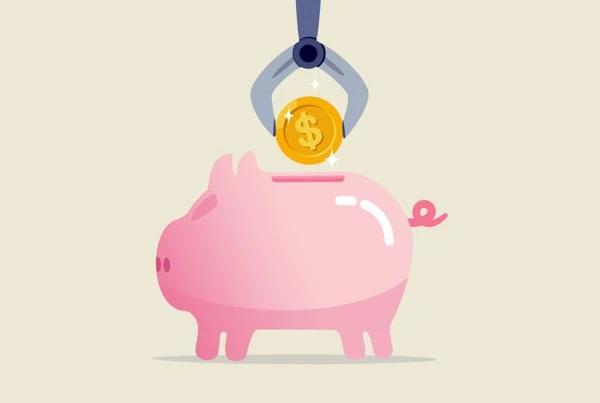Most consumers know having good credit is beneficial when buying big-ticket items, like a house or a car. However, there are many other advantages of credit and benefits of building good credit that you might not know about.
This article will help explain why good credit is essential to have in a variety of situations. It will also advise on how to access your credit report and improve your credit rating if needed.
What Does “Credit” Mean Exactly?
Credit means a few of things, depending on the context. It can be:
- A monetary amount that a creditor agrees to extend to a borrower.
- An indicator of whether or not a borrower is likely to repay a loan on time (i.e., having “good credit” or “bad credit”).
- An amount a borrower can borrow if they choose, like having a credit limit on a credit card or a line of credit on a business or home.
Related: Secured Credit Card vs. Unsecured: What’s the Difference?
What are the Benefits of Good Credit?
If you’re wondering whether or not it’s crucial to build good credit, the examples below show why you should have it. From a financial perspective, there are many situations where having good credit can save you thousands of dollars over the long term.
1. Best Loan Terms
This rationale serves as the most important reason to build good credit. Those with excellent credit typically qualify for the best loan terms. Meaning, if you have good credit, you will generally receive lower interest rates than someone with bad credit.
A study by Self reported, “Those with the best credit scores will be paying over five times less [in interest] than those in the Subprime category” when it comes to mortgage rates.
Additionally, the study tracked the total interest people pay over their lifetimes depending on their credit score.
Those with credit scores between 760-850 paid $88,388 in interest over their lifetime. But, those who had below a 620 credit score paid an astonishing $486,040 in interest over their lifetime.
In other words, having good credit can save you hundreds of thousands of dollars throughout your life.
2. Qualify for Better Credit Cards
Not all credit cards are created equally. You must have good or excellent credit to qualify for the best credit cards, like travel rewards cards or other elite cards.
Some credit card rewards offer hundreds of dollars in bonuses, statement credits, free nights in hotels, and more. However, these perks and the ability to travel hack using them are typically reserved for people who have excellent credit scores.
This is one of the benefits of good credit, especially if you love traveling.
3. Apartment Hunting
When you apply to rent an apartment, it’s common for landlords to run your credit report. After all, they want to make sure you’ll pay the rent on time.
If you don’t have a credit history or a very thin credit file, it could deter landlords from entrusting you with a lease. Moreover, if you live in a competitive area, landlords are more likely to choose a tenant with an excellent credit rating and a history of on-time payments.
4. No Deposits Needed for a Utility Company
When you rent an apartment or own a house for the first time, you have to set up an account for utility services. This might include working with a utility company and paying your electric bill, your gas bill, and your water bill.
If you have poor credit, the utility companies will often require you to make security deposits that they’ll eventually return to you after a set amount of on-time payments.
If you have a good credit score, you can often set up your utilities without making a deposit. This is nice, as you get to keep your cash in your pocket.
5. Lower Car Insurance Rates
Many car insurance companies now reward customers who have good credit with better car insurance rates and more affordable premiums.
If you live in an area with exceptionally high insurance prices, this could be an excellent way to save money on your bill.
6. Getting a Job
If you are applying for a job, it’s essential to know some employers will run your credit as part of the hiring process. Having good credit shows you’re responsible, which is a trait many employers look for in applicants.
Bad credit might indicate that you don’t follow through on your promises or have difficulty meeting deadlines. It also could show desperation to accept any job offered to you, hiding that you might not represent the best candidate available for the role. That’s why it’s essential to build good credit so you don’t negatively impact your chances of securing a job in the future.
In other words, strong credit history has a significant impact on your financial life and your career.
7. Getting a Cell Phone
Getting a cell phone contract is just that – a contract. To qualify for a cell phone contract with a major servicer, the phone carrier will first check your credit score. Having a low credit score or a history of non-payment of cell phone bills could result in your inability to get a cell phone.
What Else Can a Good Credit Score Get You Beyond Better Loan Terms?
Good credit scores can also help people rent cars, lease cars, and buy cars. Most major car rental agencies require a credit card, and to be approved for a credit card with a high enough credit limit to rent a car, you’ll need good credit.
Additionally, more and more insurance companies beyond car insurance companies are giving discounts to customers with a high credit rating. Because of this, you can save money every month on your bills simply because you built good credit.
How Can You Build Your Credit History?
There are many ways to build your credit history. First, you can apply for a starter credit card, and these are designed for people to begin their credit files.
Having one or two credit cards that you use regularly (and pay off your credit card balances in full each month) will help establish a positive relationship between you and the bank, leading to better interest rates and higher credit card limits over time.
It demonstrates you have sound financial health when it comes to borrowing money and repaying it. No late payments on a loan or credit card help to build a high credit score over time.
Once you have established your ability to make payments on time consistently, you will eventually qualify for other types of loans such as mortgages, car loans, or personal lines of credit.
You may even have more negotiating power on loan terms like a lower interest rate as you can shop around for the most competitive terms with high approval odds.
If you have student loans, those will also become a part of your credit file and help to build a good score on your credit.
Ultimately, it’s essential to use your accounts responsibly and make sure you pay them off every month. Lenders like seeing people who do what they say, so it’s very beneficial if somebody builds up their payment history before applying for more significant amounts.
Building good credit takes time, but it doesn’t have to be complicated. A good rule of thumb is to try not to use more than 30% of your available credit on your credit cards.
Keep in mind that every missed payment or maxed-out line of credit can damage your credit, so strive to keep your balances low and ideally pay them off entirely.
A good tip is to set up automatic payments and budget one month ahead, so you always have money available in your account to pay your bills.
Related: Best Credit Cards for Students with No Credit
What is a Good Credit Score?
A good credit score is 700 or above, a very good credit score is 740-799, and an exceptional credit score is 800 to 850. These credit scores make you accessible to competitive lending terms unavailable to many with lower credit scores.
What is a Bad Credit Score?
A credit score of less than 650 can indicate to lenders that you are a riskier borrower, meaning they will charge you higher interest rates or deny your application for certain loans.
If you have poor credit, it may be challenging to qualify for any loan at all. And, if you do qualify, it will likely be an unaffordable rate with unfavorable terms.
How Can You Check Your Credit Report?
You can check your credit report by going to annualcreditreport.com, a free service provided by the three major consumer reporting companies: Equifax, Experian and TransUnion. You can order one of your reports from each company for free every year.
If you want to check your actual credit score for free, you can do so by signing up for Credit Karma. This site will show you your Vantage Score, which has a close correlation to the FICO score that many creditors use.
The Benefits of Good Credit are Worth It
There are numerous examples of why establishing a credit history is essential. By far, the most important reason for building a good credit score is the money you save on interest when applying for loans to buy a house or a car.
A good credit score can also help you secure an apartment, get your cell phone plan, and give you access to be the best reward credit cards from credit card companies and have higher credit limits.
Whether fair or not, the fact is lenders rate borrowers based on their credit profiles. They won’t know anything about your personality or that you’re a good person from reviewing your credit report.
All lenders will see is your credit score and credit history, so it’s crucial to work towards having a good one so you can have as many financial opportunities as possible.
Related:







![Check Out the New 401(k) Contribution Limits for 2026 [Save More for Retirement] 10 number blocks switching from 2025 to 2026.](https://youngandtheinvested.com/wp-content/uploads/2025-to-2026-blue-background-1200-600x403.webp)

![7 Best Microsavings Apps [Save Money, Reach Your Goals] 12 best microsavings apps](https://youngandtheinvested.com/wp-content/uploads/best-microsavings-apps-600x403.webp)
